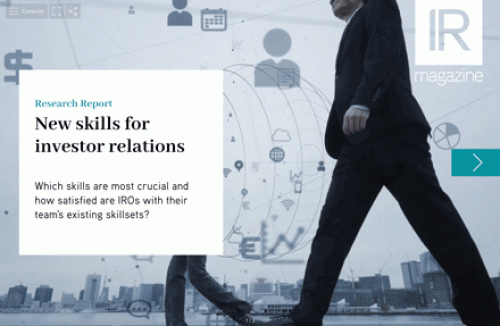A new study by CIRI reveals that IR professionals are gaining stature at their companies with executive committees and boards requiring strategic input, ESG advice and support on shareholder engagement.
A survey of 192 IR professionals from Canadian companies finds moves within regional capital markets have significantly reshaped the role of IR professionals over the past few years.
 While the number of professionals working for companies with separate IR departments has not changed dramatically since 2019, the proportion of those reporting to C-suite executives has increased by 9 percentage points in three years. Beyond that, IR remains mostly rooted in the finance division with 54 percent of respondents reporting to the CFO against 34 percent reporting to the CEO.
While the number of professionals working for companies with separate IR departments has not changed dramatically since 2019, the proportion of those reporting to C-suite executives has increased by 9 percentage points in three years. Beyond that, IR remains mostly rooted in the finance division with 54 percent of respondents reporting to the CFO against 34 percent reporting to the CEO.
Furthermore, an increasing number of IROS have taken on increased responsibilities in line with ESG and sustainability requirements and strategies. The data shows more than half (55 percent) directly engage with ESG investors, while 50 percent write and edit sustainability reports and nearly 30 percent are responsible for the development of ESG strategies.
‘Over the last several years, the investor relations profession has been impacted by changes in the Canadian capital markets, the economy and the environment, some of which have been driven by the pandemic. This has required IROs to evolve their practices and take on additional, more strategic responsibilities,’ says Yvette Lokker, CIRI’s president and CEO.
Higher rewards
 To demonstrate the growing strategic status of the profession, IR budgets have also enjoyed a boost, with companies allocating 6 percent more to them in 2022 than in 2019.
To demonstrate the growing strategic status of the profession, IR budgets have also enjoyed a boost, with companies allocating 6 percent more to them in 2022 than in 2019.
Cash compensation for IROs rose by more than $20,000 over the past three years. As a result, nearly 60 percent of professionals earned at least $225,000, including 28 percent who earned more than $300,000.
‘In addition, most IROs (79 percent) received long-term incentive awards this year, which is up from 59 percent in the last survey,’ says Peter Landers, senior partner at GGA.
‘This indicates the relative seniority of participants in this year’s survey and that companies want to align their pay with longer-term performance given the critical role [IROs] play beyond one year.’










